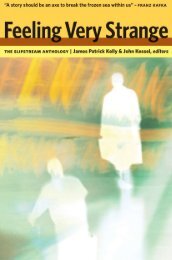The Curse of the Wer.. - Site de Thomas - Free
The Curse of the Wer.. - Site de Thomas - Free
The Curse of the Wer.. - Site de Thomas - Free
You also want an ePaper? Increase the reach of your titles
YUMPU automatically turns print PDFs into web optimized ePapers that Google loves.
WEREWOLVES AND SCHOLARS<br />
shape in this unaccountable manner, and in ano<strong>the</strong>r minute <strong>the</strong>y were<br />
all in full cry after <strong>the</strong> wretched victim <strong>of</strong> science, who might have fared<br />
badly in<strong>de</strong>ed had he not succee<strong>de</strong>d in gaining a carriage on <strong>the</strong> highroad<br />
before his pursuers came up. 69<br />
<strong>The</strong> ‘mistaken werewolf’ i<strong>de</strong>a in fact became a regular motif in Victorian<br />
fiction. <strong>The</strong>se narratives would generally involve an individual<br />
pretending to be a werewolf amongst credulous peasants (or peasants<br />
persecuting an individual <strong>the</strong>y supposed to be a werewolf). <strong>The</strong><br />
situation would be resolved through <strong>the</strong> rational explanation <strong>of</strong> <strong>the</strong><br />
‘objective’ protagonist or narrator. 70<br />
While <strong>the</strong> early folklorists’ monographs were generally collections <strong>of</strong><br />
material from a <strong>de</strong>signated area, <strong>the</strong> urge towards <strong>the</strong> more scientific<br />
analysis <strong>of</strong> folklore came to fruition in 1856 with <strong>the</strong> publication <strong>of</strong><br />
Max Müller’s essay ‘Comparative Mythology’. Müller held a pr<strong>of</strong>essorship<br />
at Oxford, but he had been schooled in <strong>the</strong> German tradition <strong>of</strong><br />
philological mythology foun<strong>de</strong>d by <strong>the</strong> Bro<strong>the</strong>rs Grimm, a tradition<br />
characterized by an emphasis upon <strong>the</strong> role <strong>of</strong> language in <strong>the</strong> evolution<br />
<strong>of</strong> folklore and mythology. Basing his <strong>the</strong>ory upon a knowledge<br />
<strong>of</strong> Sanskrit, Müller postulated that myths are born from ‘a disease <strong>of</strong><br />
language’. Dorson summarizes his argument succinctly:<br />
All <strong>the</strong> Indo-European peoples belonged to a common Aryan stock; after<br />
<strong>the</strong> migration <strong>of</strong> <strong>the</strong> European groups from <strong>the</strong>ir Indic homeland, <strong>the</strong><br />
parent language, and <strong>the</strong> mythology it related, splintered into various<br />
<strong>of</strong>fshoots. A time came when <strong>the</strong> original meanings <strong>of</strong> <strong>the</strong> names <strong>of</strong> <strong>the</strong><br />
Vedic gods [those <strong>de</strong>ities <strong>de</strong>scribed in <strong>the</strong> Veda, an ancient Sanskrit text]<br />
were forgotten, and survived only in mythical phrases and proverbs <strong>of</strong><br />
uncertain sense. Stories <strong>the</strong>n <strong>de</strong>veloped to explain <strong>the</strong>se phrases. From<br />
this ‘disease <strong>of</strong> language’ myths were born. 71<br />
<strong>The</strong> task <strong>of</strong> <strong>the</strong> comparative mythologist, <strong>the</strong>n, was to sift through<br />
mythological systems in search <strong>of</strong> linguistic and <strong>the</strong>matic clues which<br />
would indicate <strong>the</strong> origins and genealogy <strong>of</strong> <strong>the</strong> myth, and which would<br />
explain <strong>the</strong> relationships between apparently diverse stories. Müller<br />
himself believed that <strong>the</strong> primary subject <strong>of</strong> early mythology (and hence<br />
all subsequent mythology) was <strong>the</strong> rising and setting <strong>of</strong> <strong>the</strong> sun, which<br />
is why his approach was sometimes referred to as ‘solar mythology’:<br />
33





